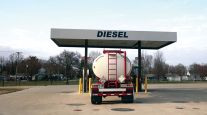Economy to Continue Growing Slowly, But Fleets Should Prosper, Panel Says
This story appears in the Oct. 25 print edition of Transport Topics.
PHOENIX — The U.S. economy will skirt a second round of recession, although growth will probably remain sluggish for at least three quarters, a team of economic forecasters told members of American Trucking Associations.
However, because what new freight is available will be spread among far fewer motor carriers, trucking companies should start to enjoy handsome prosperity, they said.
“When we meet next year at this time in Dallas, we will be on the cusp of some of the best years in trucking’s history,” ATA Chief Economist Bob Costello said here Oct. 18 at ATA’s Management Conference & Exhibition.
The freight transportation industry got pounded during the 2008-2009 recession, with freight falling 16.5% from peak to trough across all modes. However, Costello also predicted there is only a 25% chance of a “double-dip” recession.
As part of the annual “All Eyes on the Economy” panel, David Huether, chief economist of the National Association of Manufacturers, described the economic recovery as “lackluster,” even though it has been led by manufacturing. He estimated that the total number of U.S. jobs will not return to the December 2007 peak level until the first quarter of next year.
Population growth means it will be even longer before the unemployment rate drops significantly, Costello said.
The retail industry should post a holiday season gain, said Scott Krugman, vice president of the National Retail Federation, but only 2.3% over a dismal 2009 season. Krugman said his industry has an unusual split, with vendors of luxury goods such as jewelry doing well and discounters, too, but the vast middle still doing poorly.
“Consumer confidence has been in decline since March. Consumers are not buying our way out of recession,” Krugman said.
The final member of the panel was broadcaster Bill Kurtis, who served as moderator.
Costello and Huether both expressed concern about the tepid nature of the recovery. Huether said one reason for that is the health of consumer services industries. He said they usually make up about 48% of gross domestic product, but their year-over-year change is only slightly positive.
He also said that housing usually makes up a strong part of an economic rally, but that sector is still depressed.
Instead, it is manufacturing and exports in particular that are driving what recovery there is. Huether said the United States still is the world’s biggest manufacturer by dollar volume and said he wishes the country placed more emphasis on exporting goods.
Huether also said manufacturers should be more public about opposing protectionist policies, adding that he expects the gross domestic product to grow 1.8% to 2.5% this year and then to accelerate by the end of next year.
Costello said the U.S. economy has grown by 3% a year on average for many years, but he does not think the nation will enjoy a pace that high until 2012. He said that is especially puzzling because bad recessions usually give way to strong recoveries — but not this time.
“If you had told me there would be a recession this bad, normally I’d say we’d be growing like gangbusters” by now, he said.
In looking at credit markets, he said companies with strong finances can get financing on “super terms,” but there is not much credit available for companies on the edge.
As for trucking, Costello said that while the industry lost a lot of business during the recession, it also lost a lot of capacity.
“We’ve never seen so much supply come out of this industry, and now that will start to pay dividends,” he said.
Costello said he thinks more carriers will close because lenders will now be less hesitant to pull the plug on non-performing loans.
He also does not see healthy carriers adding substantial numbers of trucks. In addition, tighter regulations on hours of service and some other trucking issues will have the side effect of stifling even more capacity.
“Demand won’t grow a lot, but carriers will still do well,” he predicted.
Krugman said the last two holiday seasons have been so bad for retailers that the industry has had to redefine the notion of good results.
“We used to think a 5% holiday gain was good through 2007, but based on the last two years, now it looks like 2.5% is good,” he said.



